
“Reproductive Justice as Community Care”
by Camryn Jackson
It is fair to say that many Americans think of community care as a term representative of togetherness—to ensure wellness among our neighbors and to protect the well-being of others. I agree with this statement, but I think it is especially important to highlight and recognize Reproductive Justice within this narrative of community care. While certain areas within Reproductive Justice have a history of dividing our communities, many people fail to acknowledge the aspects within its framework that positively serve them. Reproductive Justice is community care as it is rooted in equity, inclusion, and liberation. This is precisely what the Black Feminist Rants podcast aims to share with the world.
This past fall semester, I had the privilege of working with the Black Feminist Rants (BFR) team as their Research and Content Writing Intern. Eager to learn and expand on my interest in reproductive health, my time working with BFR allowed me to receive an even greater appreciation for equity and inclusion as it is essential to the societal advancement of our modern world. My research covered topics such as self-managed and telehealth abortion, LGBTQ+ discrimination within the healthcare system, and racial barriers within the sperm donation application process. Over time, research led me to the re-emphasis of a few essential truths. We cannot discuss equity without addressing systematic social determinants affecting marginalized communities and fulfilling the necessity for access to safe resources. Similarly, we cannot discuss the feminist movement without seeing to the lack of recognition and prioritization of issues affecting marginalized femme people. Only by knowing these truths of social change can we propel our communities forward and truly care for the people within them.
With social change in the reproductive justice framework, which amplifies the voices of marginalized communities, comes the liberation of many—liberation beyond the barriers that society has placed before them and to express themselves freely with power and without shame. It has inspired the creation of BFR as BFR has inspired me in becoming a better advocate for my community and encourage liberation in others. Given the space to create a Reproductive Justice 101 zine, collaborate with local reproductive justice organizations, learn from black women in leadership, and share the importance of reproductive justice with my own Tulane community, my internship with BFR has allowed me to grow creatively, professionally, and personally as I have pleasantly learned much more than I ever expected. Further, my experience within the Newcomb Institute has made it clear that if we refocus our definition of community care on a more equitable, intersectional, and complete well-being for all, only then are we truly applying it.
